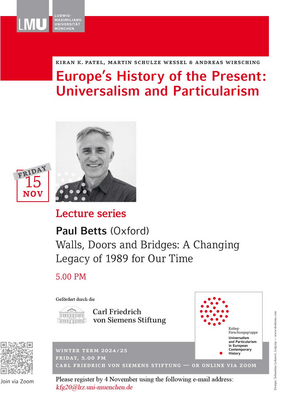It has been widely remarked that the 21st century has become a New Age of Walls, and not just in Europe. Its emergence seems to spell the end of the open and cosmopolitan spirit of 1989 in Central Europe and across the world. By contrast our era is often described as an illiberal “counter-revolution” that explicitly rejects the hopes and values of the annus mirabilis 35 years ago. My presentation will address this interpretation in several ways. First, I hope to show that many of the aspects that we associate with the more recent populist rejection of liberalism is not a new response to the economic and migration crises of the early 21st century, but in fact started much earlier. Secondly, there was a good amount of border-crossing in 1989, but much of it was neither voluntary nor welcome. Thirdly and perhaps most importantly: while many barriers have been constructed to keep unwanted peoples from entering various territories, wall construction has not only been physical. We have done the same with the inheritance of 1989 itself, erecting a set of conceptual walls, doors and bridges that have prevented us from acknowledging the shadowsides of 1989 and its aftermath. In this regard, I will revisit some of the forgotten lessons and legacies of that revolutionary year, and why its evolving relevance has become a new foundational past for our own time.
Paul Betts is Professor of Modern European History at Oxford University; he has published widely on Modern European and German history, including most recently Ruin and Renewal: Civilising Europe after 1945 (2020) (German Edition Ullstein) and Within Walls: Private Life in the GDR (2010). He has also co-edited 8 volumes, most recently a book (with Marcus Colla) on socialist space (2024).
Anmeldung bitte bis zum 4. November über die E-Mail-Adresse kfg20@lrz.uni-muenchen.de.
Der Vortrag findet in den Räumlichkeiten der Carl Friedrich von Siemens Stiftung am Südlichen Schloßrondell 23 statt.
Mehr Informationen erhalten Sie hier.

